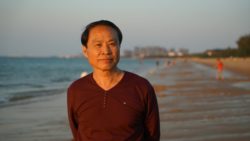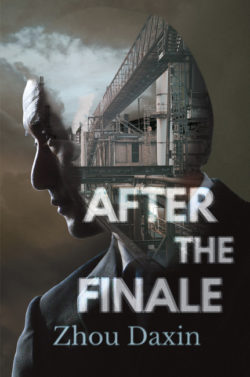April 2022: Zhou Daxin 周大新
 Born in Dengzhou, north-central China in 1952, Zhou Daxin is a novelist, short-story writer and essayist whose realist fiction mostly focuses on ordinary people in his home province of Henan. He made his literary debut in 1979 and has published nine novels, thirty-three novellas and more than seventy short stories, as well as essays and plays. In 2016, People’s Literature Publishing House published Selected Works by Zhou Daxin, a twenty-volume collection of novels, novellas, short stories, essays and a screenplay. Zhou has received numerous awards, including the National Outstanding Short Story Award, the Feng Mu Literature Prize, the People’s Literature Award, the Mao Dun Literature Prize, and the Lao She Prose Essay Award. His works have been translated into a dozen languages including English, French, German, Japanese, Arabic, Spanish and Greek. He currently resides in Beijing.
Born in Dengzhou, north-central China in 1952, Zhou Daxin is a novelist, short-story writer and essayist whose realist fiction mostly focuses on ordinary people in his home province of Henan. He made his literary debut in 1979 and has published nine novels, thirty-three novellas and more than seventy short stories, as well as essays and plays. In 2016, People’s Literature Publishing House published Selected Works by Zhou Daxin, a twenty-volume collection of novels, novellas, short stories, essays and a screenplay. Zhou has received numerous awards, including the National Outstanding Short Story Award, the Feng Mu Literature Prize, the People’s Literature Award, the Mao Dun Literature Prize, and the Lao She Prose Essay Award. His works have been translated into a dozen languages including English, French, German, Japanese, Arabic, Spanish and Greek. He currently resides in Beijing.
Bio from Sinoist Books
 This month we're delighted to feature an excerpt from Zhou's novel, After the Finale (曲终人在), the fictional biography of Ouyang Wantong, former governor of Qinghe Province, dead at 66. The novel is told through the voices of relatives, colleagues, employees and others - some of whom loved him, others who wished him dead. In our extract we hear from his chauffeur, Wang Jiqing, a man who saw some of the dangers surrounding the governor. You can read the English translation by Wu Jiamei, as well as the original Chinese.
This month we're delighted to feature an excerpt from Zhou's novel, After the Finale (曲终人在), the fictional biography of Ouyang Wantong, former governor of Qinghe Province, dead at 66. The novel is told through the voices of relatives, colleagues, employees and others - some of whom loved him, others who wished him dead. In our extract we hear from his chauffeur, Wang Jiqing, a man who saw some of the dangers surrounding the governor. You can read the English translation by Wu Jiamei, as well as the original Chinese.
After the Finale is a fictional biography of an extraordinary man who grew up in poverty in China’s Mao era and then rose through the ranks of government during the country’s period of reform and opening up. It’s a tale of love, leadership, betrayal, corruption, lust, greed and the nature of power amid the rise of the 21st century’s new superpower.
If you want to find out more about Zhou Daxin, you might be interested in watching this interview with Sinoist Books and Guanghwa Bookshop, where he discusses another novel published by Sinoist, Longevity Park (translated into English by James Trapp).
